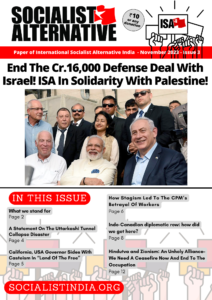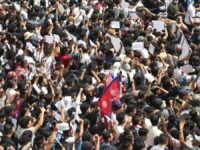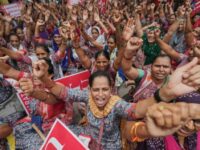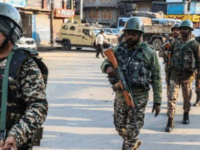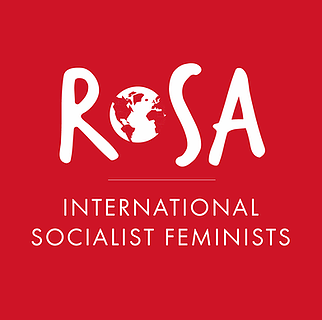Vijay’s new party: will the TVK live up to its promises?
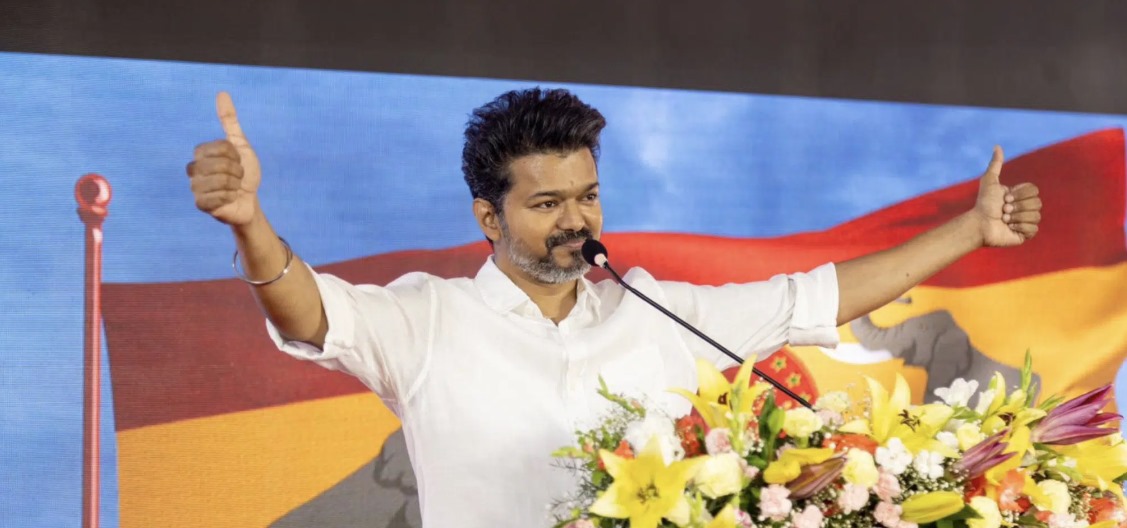
On October 27, famous Tamil film actor Thalapathy ‘Vijay’ held the first public rally of his new political party, Thamizhaga Vetri Kazhagam (TVK), which he launched in February this year. A huge crowd of several hundred thousands, prominently featuring young people and first-time voters, gathered in Tamil Nadu’s Villupuram district to hear the actor’s speech laying out the policies of the TVK.
Vijay has already shown to be a crowd-puller with an extensive fanbase. But he has also sensed that a political space exists for a left-leaning, third party alternative to the two Dravidian heavyweights who have dominated Tamil Nadu’s political life for decades.
While its welfare initiatives and opposition to the BJP allows the DMK to maintain a relatively favorable standing with sections of working class voters, it also faces mounting fatigue, frustration and discontent as corruption, nepotism, and corporate-driven ‘development’ have often put Tamil Nadu’s ruling party at odds with its stated progressivism.
Vijay’s statements against sectarian politics and corruption, his emphasis on secularism, social justice and equal opportunities and rights for all (he promised to “remove the differences in the name of caste, religion, gender, and place of birth”) resonate in a state where oppressions and inequalities remain rife. His explicit acknowledgment of not only leaders like Periyar and Ambedkar but also female icons such as Velu Nachiyar and Anjalai Ammal, stands out in a notoriously male-dominated political arena.
There are certainly a number of demands in the TVK’s program that socialists would support. Improving the standards of education and healthcare, defending the two-language policy, opposing the Union government’s laws that stigmatizes Muslims like the CAA and the Waqf Amendment Bill, abolishing the National Eligibility Entrance Test (NEET) or eliminating the post of Governors.
Noteworthy is Vijay’s call for an independence referendum for Eelam Tamils in Sri Lanka —a stance that may unsettle a DMK that has remained conspicuously silent on the Eelam Tamils’ right to self-determination for years, and let them down during the height of their genocide. Additionally, the TVK’s ecological stance, which calls for an end to sand mining, the illegal extraction of groundwater and minerals, and opposes the construction of the second airport at Parandhur, holds significance in light of the environmentally harmful policies pursued by both state and central governments.
The fact that the mother of a 17-year-old protestor who was gunned down by the Tamil Nadu police during the Thoothukudi anti-sterlite protest in 2018 joined the TVK and publicly expressed disappointment with M.K. Stalin’s government for inaction against the senior police officials responsible for the killing of 14 protestors underscores the TVK’s potential to appeal to those disillusioned by the Dravidian parties’ failures in ensuring accountability for state violence, and to amplify voices long marginalized or ignored by the state’s political establishment.
Beyond the rhetoric: the TVK’s unanswered questions and shortcomings
That being said, there are many areas of concern as well as contradictions in Vijay’s political approach that warrant careful examination. While a Tamil celebrity leveraging his fame to advocate for political change is not inherently negative and can bring attention to important issues, it also comes with inherent risks. The transition from cinema stardom to personality-driven political cult is a well-established tradition in Tamil Nadu, and the danger to reproduce this pattern is all too real if the TVK does not develop democratic structures to empower and engage its supporters. Whether the numerous local fan clubs of Vijay can be the embryo of genuine political organizing remains to be seen.
The remarks made some months ago by TVK’s general secretary ‘Bussy’ Anand have highlighted this danger of top-down, mystified, personality-centric decision-making —along with the disconnect between the life of the rich and famous, and the daily reality of ordinary people. During a gathering of Vijay’s TVK members, Anand asked: “What does it matter if you lose your job? What does it matter if you don’t need a job to see Thalapathy? The true follower of TVK is the one who gives it all up to see him”. This blind devotion to the party leader and its transformation into a near-deity are practices that have long corroded Tamil Nadu’s political scene, including on the left. Any genuine political alternative must break free from this toxic culture rather than replicate it; this requires building a mass-based movement that empowers ordinary people, encouraging them to think and fight for themselves —a movement where collective strength matters more than the aura of any influential individual.
Moreover, this remark is dangerously out-of-touch with the material conditions of poverty, unemployment, and rising prices that define the lives of millions in the state. Vijay’s popularity and influence, derived from his successful film career, give him an immense platform. But without critically addressing the gap between his privileged position and lifestyle as the country’s highest paid actor, and the hardships of the ordinary people he seeks to represent, his calls for social justice risk appearing as little more than theatrical rhetoric.
Without naming them directly, Vijay takes digs at the corruption and “dynasty politics” of the DMK (which he referred to as his party’s political enemy) —while implicitly branding the BJP and its divisive agenda as its “ideological” enemy. The DMK, a pro-capitalist party, often uses the ‘fight against fascism’ and the central government as a shield to deflect genuine criticism of its own policies. It is commendable that Vijay does not allow himself to be confined by this straight jacket. Contrary to what VCK leader Thirumavalavan suggested in his attacks on Vijay (“To oppose fascism in India, in Tamil Nadu, is to oppose the BJP. Yet, Vijay has made a sarcastic comment about those who stand against fascism”), opposing the far-right does not mean leaving anti-BJP forces untouched when some of these very forces are involved in anti-people policies. When the DMK indulges in corruption dealings, sends the police against striking workers, increases electricity tariffs for consumers or remains silent on caste atrocities to protect its vote banks, holding it accountable is the duty of any left worthy of the name. Failing to do so not only weakens the struggle against the far-right; it nurtures the soil on which it grows.
Nonetheless, Vijay’s reluctance to explicitly identify his political opponents, combined with his announcement that all political outfits were welcome to join him in his fight —and his promise to offer them a “share in power” if elected— also raises questions as to the malleability of his stated principles. If Vijay was to team up with the AIADMK, for example, all his anti-corruption talks would fall flat, given that party’s own notorious track record on this question.
The TVK’s focus on the 2026 assembly election also leaves a critical gap in what happens between now and then. Relying solely on an electoral strategy risks missing the essential work of grassroots activism, of engaging with communities, and of supporting the day-to-day struggles of ordinary working class and oppressed people, beyond the ballot box. For instance, the recent 38-day strike by Samsung Electronics workers at the Sriperumbudur plant highlighted pressing issues of factory exploitation, unionization, and the use of the state apparatus to crack down on labor rights; yet it passed without any public comment from the TVK. Supporting such struggles, in words and in deeds, would demonstrate a commitment to the values the party promotes, positioning it as a useful instrument for advancing the rights of workers, poor and marginalized communities, rather than merely another electoral machine.
Additionally, parts of the TVK’s program remain vague and underdeveloped, and in some cases downright problematic. For instance, its demand to close down all liquor shops in the state —a demand veering towards effective prohibition— is a kneejerk and counterproductive response to the real problem of alcohol abuse. Empirical evidence, including in contemporary India —as exemplified again by the recent deadly tragedy in Siwan, Bihar— shows that prohibition does not eliminate demand; it tends to drive the alcohol market underground, leading to more unregulated production, further worsening the dangers to public health and strengthening organized criminal networks.
More fundamentally, the TVK has thus far not addressed the main “elephant in the room”. Many people can indeed easily identify with the idea of a “corruption-free, secular, and social justice government” —but Vijay has yet to clarify what this actually entails or how it will be implemented in concrete terms. His egalitarian rhetoric, borrowing heavily on Dravidian and Tamil nationalist themes and references, is on paper not so different from those of the Dravidian parties themselves. What is missing from this discourse is a substantive critique of the social order that underpins injustice at its core — a system neither of these parties has ever meaningfully challenged: capitalism, with its inherent drive for wealth concentration in the hands of a few and the relentless exploitation of the many.
Despite their ideological and political differences, the DMK and the BJP share the common trait of upholding the logic of this system. Both are implicated, for example, in Adani Group’ scheme to bribe Indian officials for securing contracts, as detailed in the recent indictment by the U.S. Justice Department. Only by confronting the rule of capital and by rooting itself in the struggles of the working class and the oppressed can any new political force begin to address the root causes of corruption, caste and gender-based discrimination, economic disparity and ecological destruction —issues that plague not only Tamil Nadu, but India and the entire world.
